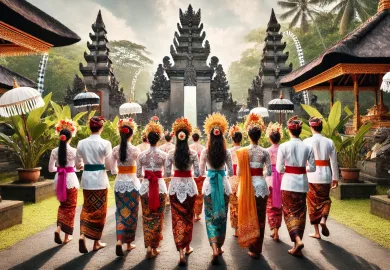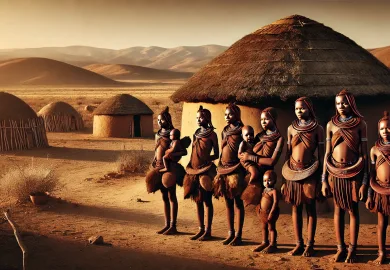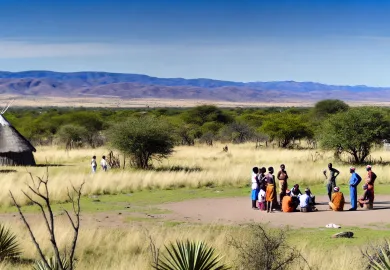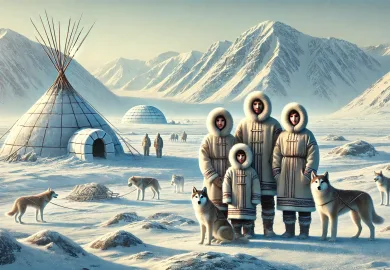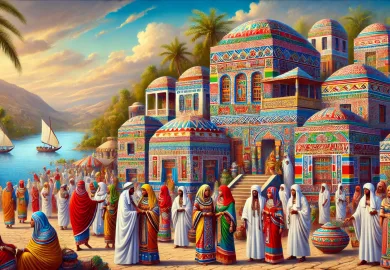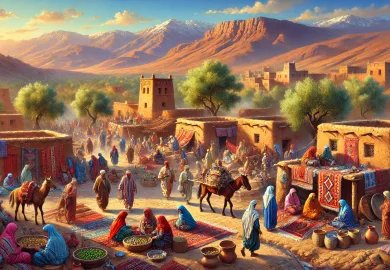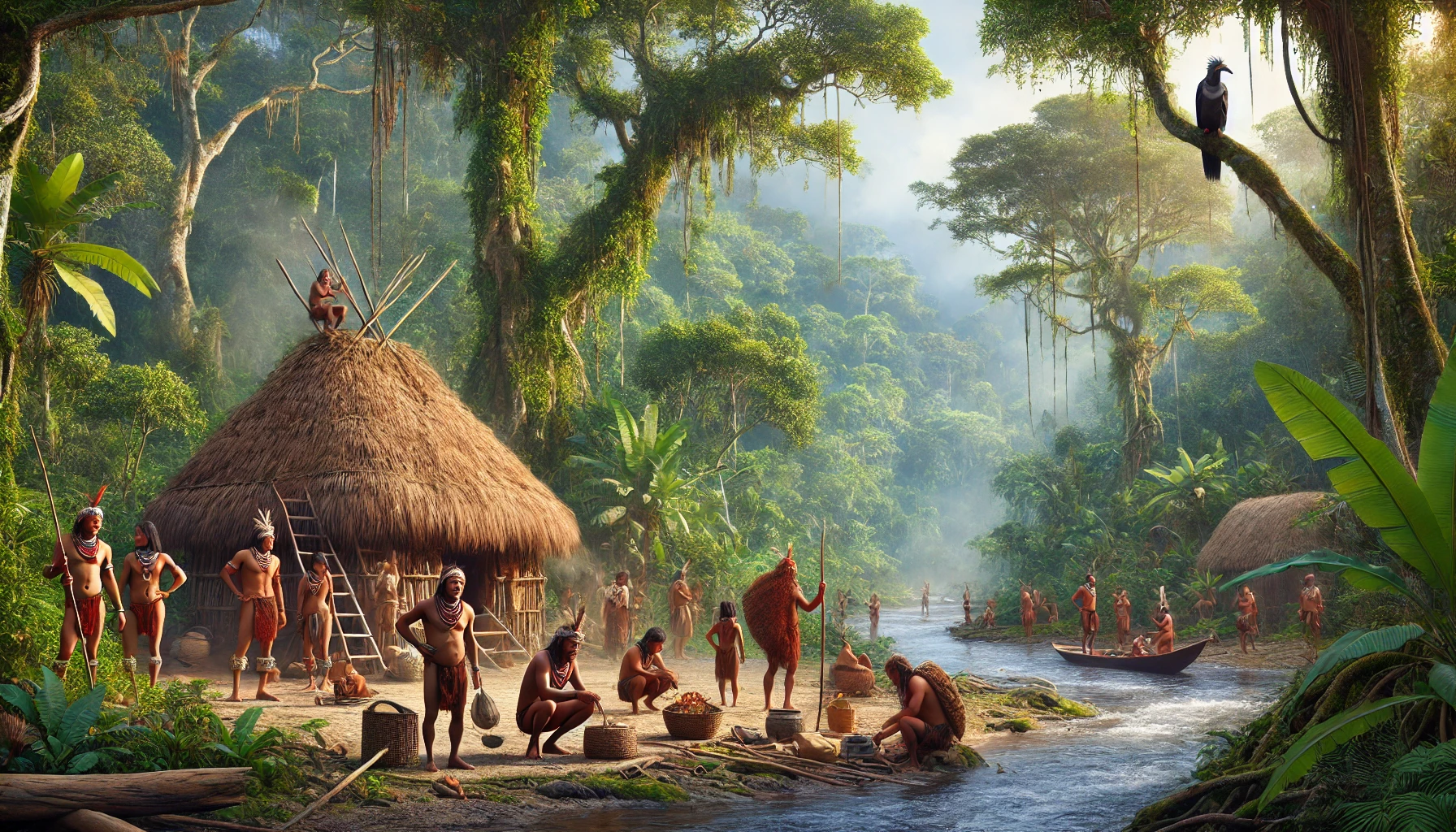
Disclaimer: This content was generated using AI. While I strive for accuracy, I encourage readers to verify important information. I use AI-generated content to increase efficiencies and to provide certain insights, but it may not reflect human expertise or opinions.
The Huaorani people, an indigenous group residing deep within the Ecuadorian Amazon, have captivated the curiosity of anthropologists, travelers, and environmentalists alike. Known for their rich culture, profound connection to nature, and unique language, the Huaorani have managed to preserve much of their traditional way of life despite increasing pressures from the modern world. This article delves into the fascinating culture of the Huaorani, their challenges, and their significance in the context of Amazonian biodiversity.
The Huaorani: An Ancient People with a Unique Language
The Huaorani, also known as Waorani or Waodani, are one of the most isolated indigenous groups in the world. They have lived in the Ecuadorian Amazon for centuries, maintaining a lifestyle that is intricately tied to the rainforest. With a population of around 4,000 people, the Huaorani occupy a territory of approximately 6,125 square kilometers, a vast area of dense jungle that they have successfully defended against outside encroachment.
The Huaorani speak their own language, Huaorani (Wao-Terero), which is unrelated to any other language in the world. This linguistic isolation has contributed to their distinct cultural identity. Unlike most other indigenous languages in the region, Huaorani is a language isolate, meaning it has no known relatives, making it a subject of significant interest among linguists. The language plays a crucial role in preserving their traditions, oral histories, and knowledge of the forest.
Traditionally, the Huaorani were semi-nomadic hunter-gatherers, living in small, kin-based groups. Their deep knowledge of the rainforest allowed them to thrive in one of the most biodiverse but challenging environments on Earth. They hunted using blowguns and spears, and their diet consisted of a variety of animals and plants found in the forest. The Huaorani’s intimate relationship with their environment is evident in their spiritual beliefs, which hold that all living things have souls and are interconnected.
Huaorani Spiritual Beliefs and Their Connection to the Amazon
The Huaorani’s spiritual beliefs are deeply intertwined with their environment, reflecting a worldview where nature and humanity are inseparable. The rainforest is not merely a backdrop for their existence but a living entity that sustains them spiritually and physically. This profound connection to nature is central to Huaorani culture and is expressed through their rituals, myths, and daily practices.
One of the key aspects of Huaorani spirituality is animism—the belief that all elements of nature, including plants, animals, rivers, and mountains, possess a spiritual essence. This belief fosters a sense of respect and responsibility toward the environment, guiding their interactions with the natural world. For example, when hunting, the Huaorani perform rituals to honor the spirit of the animal and ensure that it returns to the forest in the afterlife. This practice underscores their sustainable approach to living, taking only what is necessary and giving back to the earth.
The Huaorani also believe in the existence of multiple spiritual realms, which they access through shamanic practices. Shamans, known as “menkamae,” are revered figures in Huaorani society. They act as mediators between the human world and the spiritual world, performing healing rituals, interpreting dreams, and guiding the community through difficult times. The shaman’s role is crucial in maintaining the balance between the Huaorani people and the natural forces around them.
Despite the encroachment of modern influences, many Huaorani continue to practice their traditional spiritual beliefs, resisting the pressures to convert to Christianity or adopt other religions. However, these beliefs are under threat as younger generations are increasingly exposed to external cultures and education, which may erode their connection to traditional practices.
The Challenges Facing the Huaorani in the Modern World
While the Huaorani have managed to preserve much of their culture, they face significant challenges in the modern world. The most pressing threat comes from the oil industry, which has been encroaching on their territory since the 1960s. The discovery of vast oil reserves in the Ecuadorian Amazon has led to deforestation, pollution, and displacement of indigenous communities, including the Huaorani. Despite legal protections and efforts by the Huaorani and environmental organizations to resist these developments, the pressure from oil companies remains relentless.
Oil exploration and extraction have not only led to environmental degradation but have also caused social and cultural disruption among the Huaorani. The influx of outsiders into their territory has introduced new diseases, altered traditional social structures, and created dependency on outside goods and services. This has had a profound impact on Huaorani society, particularly among the younger generation, who are increasingly drawn to the allure of modernity.
Another significant challenge is the loss of traditional knowledge. As the Huaorani interact more with the outside world, their traditional ways of life, including their knowledge of medicinal plants, hunting techniques, and spiritual practices, are at risk of being forgotten. The shift towards a more sedentary lifestyle, driven by external pressures, has also contributed to changes in their diet and health, leading to the rise of lifestyle-related diseases that were previously unknown among the Huaorani.
Despite these challenges, the Huaorani have shown remarkable resilience in the face of adversity. They have formed alliances with other indigenous groups, NGOs, and environmental activists to fight for their rights and protect their land. The Huaorani have also used modern tools, such as legal actions and media campaigns, to raise awareness of their plight and to seek justice. Their struggle is a testament to their enduring spirit and determination to safeguard their culture and environment.
The Importance of Preserving Huaorani Culture for Global Biodiversity
The Huaorani people are not only significant as a unique cultural group but also as vital stewards of one of the most biodiverse regions on the planet. The Amazon rainforest, where the Huaorani live, is home to an astonishing array of plant and animal species, many of which are found nowhere else on Earth. The Huaorani’s traditional knowledge and sustainable practices have helped maintain the ecological balance of this region for centuries.
The preservation of Huaorani culture is closely linked to the conservation of the Amazon rainforest. Their deep understanding of the forest’s ecosystems and their sustainable use of its resources are crucial for protecting the biodiversity of the Amazon. The Huaorani’s practices, such as rotational hunting and the use of medicinal plants, are examples of how indigenous knowledge can contribute to global conservation efforts.
Furthermore, the Huaorani’s resistance to external threats, particularly the oil industry, highlights the importance of protecting indigenous land rights as a means of conserving biodiversity. When indigenous peoples like the Huaorani are able to maintain control over their lands, the forests they inhabit are more likely to remain intact. This has been demonstrated in numerous studies showing that indigenous-managed lands have lower rates of deforestation compared to other areas.
Preserving Huaorani culture is not just about protecting their way of life but also about safeguarding the future of the Amazon rainforest and its invaluable biodiversity. The Huaorani’s fight to defend their territory is a global issue, as the destruction of the Amazon has far-reaching consequences for climate change, species extinction, and the well-being of the planet as a whole.
In conclusion, the Huaorani people of Ecuador represent a vital link between humanity and nature. Their culture, spirituality, and traditional knowledge offer invaluable insights into sustainable living and environmental stewardship. However, they face significant challenges as they navigate the pressures of the modern world. The preservation of Huaorani culture is not only crucial for their survival but also for the protection of the Amazon rainforest and its incredible biodiversity. By supporting the Huaorani and other indigenous peoples in their efforts to protect their land and culture, we are also taking a stand for the future of our planet.

